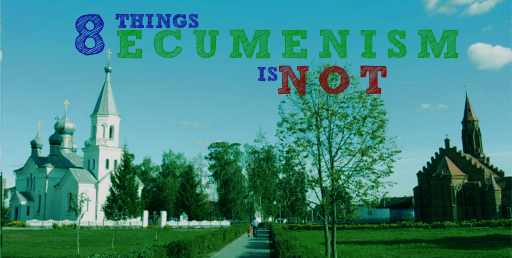Ecumenism, its purposes and its nature, seem sometimes arcane. But deeply, to me, ecumenism is highly important because it is an attempt to reflect the unity of the Body of Christ in the way we conduct worship: with one another. So here are a few things I’ve found ecumenism is not:

Photo: Yyaroshko (Wikimedia, under CC license)
1. Ecumenism is not a watering down of doctrine. It is not about trying to find the essence of Christianity and venturing no further. See, our faith is (or should be) so pervasive as to tint our every action. Therefore, sticking our ecumenical thought to what we deem essential and not saying anything about the rest is tantamount to restricting ecumenism to a tiny part of who we are.
2. Ecumenism is not about pretending we have no differences, or at least no substantial differences. It is not about burying our head in the sand and inviting others to follow our practice; nor is it about blindly following other practices by pretending they’re all the same anyway. Such an attitude is presumptuous at best, and maybe damaging – especially around issues of communion. The Body of Christ is made up of a variety of organs; that diversity should be embraced at least to some extent, rather than glossed over as “something for another day”.
3. Ecumenism is not about glorifying those differences either. The differences are there, but we are all looking towards God. And in ecumenism, we are looking towards Him together.
3. Ecumenism is not inter-faith. It’s not talking with people who are assumed to be radically different. In “doing” ecumenism, we are joining our brothers and sisters in worshiping the same God: it is joint action, and relies on an ultimately common understanding of God.
4. Ecumenism is not an excuse for evangelism. The only attitude that can be had in ecumenical events is one of brotherhood. Yes, teaching can happen, discussions can happen – and it would be a sad thing if they didn’t! After all, it wouldn’t be much of a congregation if people didn’t talk with one another, or rebuked one another. But while such disagreements and ensuing discussions are welcome, they are not the main thrust of ecumenical action.
5. Ecumenism is not about striving for peace. Peace is far more easily achieved through mutual ignorance anyway!
6. Ecumenism is not done for the sake of being nice. Who cares about niceties? We have plenty of other people to be nice to. It’s not for the sake of looking lovey-dovey and politically correct either! No, it is done because we are one body, one church, and we should sometimes start acting like it.
7. Ecumenism is not about dialogue. It’s not a question of “understanding the other” better, or of debating thorny theological points with one another. Imagine this: Calvinists and Arminians belonging to separate bodies, and joining together – and all the event revolving around predestination! There would be a point in that, granted – any discussion on predestination is welcome – but is it really everything Christians talk about? Surely not! Then why make it the main point of a joint event?
8. Ecumenism is not trumping other church activities. I see ecumenism as an outlook, an attitude which, yes, comes through in some specific events. And in an ideal world, this attitude should shine through regular church activities. But in the event it does not, there is little point going towards the outside at the expense of the inside.



